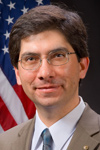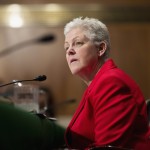Life After the EPA: What’s Next for Al Armendariz

Photo courtesy of EPA
Al Armendariz was the regional administrator for the EPA. He resigned after comments he made about enforcement came to light.
In April, a video surfaced of Dr. Al Aremendariz, the regional director for the Environmental Protection Agency (EPA), speaking to a group of locals in Dish, Texas about how to enforce pollution rules. “It was kinda like how the Romans used to conquer those villages in the Mediterranean,” Armendariz told the group. “They’d go into a little Turkish town somewhere, they’d find the first five guys they saw, and they’d crucify them. And you know, that town was really easy to manage for the next few years.”
Shortly after the video came to light, Armendariz resigned. Now he works for the Sierra Club’s Beyond Coal campaign in Texas, which aims to stop coal power plants and mining. Aremendariz recently sat down with StateImpact Texas to talk about his career with the EPA, and his new work with the Sierra Club.
Q: I want to talk about your tenure with the EPA. Looking back on it, what were some of the highs and the lows?
A: I’m very proud of the work that I did with my staff at Region 6. They’re hardworking, dedicated public servants. You know, the majority of water and wastewater plants throughout Texas and neighboring states have been funded or partially funded with federal financing that came through the EPA. So when people in Texas drink clean water or have sewer systems that don’t put sewage into their creeks and rivers, I’m very proud of the fact that the EPA helps to keep Texas clean.
Some of the highlights of my time there was the Clean Air Act work that we did in Texas.
I’m very proud that we took some very strong steps to improve the transparency of industrial emissions. So people who live near these facilities have a better idea of what these factories are putting into the air.
And I would probably call it both a high and a low, but the BP oil spill. While it was an extremely unfortunate environmental insult to the wetlands of Louisiana, I really did get to see the best of the EPA. The staff that I worked with — the wetland scientists, the emergency responders, and everyone else I worked with – all left their families for weeks on end and dedicated themselves to helping protect Louisiana.
Q: I wanted to ask you about the reason why you had to leave the EPA. Before we talk about what you said, I wonder if we could talk about the context. What led up to this meeting you were having at the time and what you were trying to get across that day.
A: I don’t want to speak too much about the comments that I made. Those were comments that I made several years ago. And I’m very focused on the job I’ve got right now with the Beyond Coal campaign.
What I’ll say is this: I’m very proud of the work I did at the EPA. And I resigned because of the controversy those two-year old remarks were creating in the media. And the work of the agency, the mission of the agency, are much more important than just one individual. And I didn’t want to spend my time in a media fight. And I didn’t think it would be fair for others at the EPA to have to spend a tremendous amount of time joining me in a media campaign against people who were already very critical of the agency. All because of remarks I made several years ago.
So because of that, I resigned, so the agency could focus on the work it has, and so I could get on with my life as well.
Q: I think the interesting thing is, though, if you look at what you said, in retrospect it was certainly a poor choice of words. But the point you were trying to get across seems like a valid one. If you had used the analogy instead of when the NCAA gave the death penalty to SMU, the effect that had on college football in both Southwestern Conference and at large, it would have been different. So it seems like it a valid enforcement philosophy, but it was the wording that caused all the ruckus.
A: You know, the choice of words that I had at that town hall meeting were unfortunate. And I’ve apologized for anyone that was offended by them. But the EPA has a very long track record of using its enforcement authority in a way that’s fair and even-handed. But it also has to discourage the breaking of our environmental statutes. The EPA doesn’t have enough enforcement staff to be in every community 24-7. And neither do the state law enforcement agencies.
So when someone is identified, and investigated as potentially breaking one of our environmental statutes, there’s a deterrent effect if there’s vigorous enforcement of the law.
Q: So tell us about your new work with the Sierra Club and the Beyond Coal campaign.
A: The coal industry is facing a number of challenges right now. Communities all across Texas have risen up to fight the construction of new plants in their communities. And the Sierra Club is proud of their work partnering with these communities to slow down or stop a number of these new plants from being constructed.
The coal industry is also being challenged by a lot of new federal regulations that are requiring the coal industry to pay for the public health costs of coal that were previously borne by the public. And they’re also being challenged by the historically low prices of natural gas, which is really put a squeeze on further use of coal. The industry from mining to power plants is having a tough time right now.
Q: But it seems like one of the difficulties with that is that Texas is in a power crunch. And if you look at the numbers, the cheapest plant to build is going to be a coal plant.
A: Texas has challenges when it comes to providing enough electricity for our growing state. We have the fastest growing population of any state in the country. We also have a very robust, growing industry base in this state. So we do need an adequate supply of electric power.
One of the challenges that’s happened in the last few years is the inability of the grid to supply a sufficient amount of power with a sufficient reserve margin. And so what we’re seeing in Texas is the construction and increased use of natural gas. But also a huge boom in renewables. There is a huge growth in wind energy. And as soon as some additional transmission lines are built from Central Texas out to West Texas over the next eighteen months, we anticipate the wind industry in this state will continue to grow.
And the solar industry is also growing in Texas. CPS down in San Antonio has recently announced that they’re going to be providing hundreds of megawatts of solar power to the citizens of San Antonio.
So we think renewables have a bright future in Texas.
Coal is getting more and more expensive. And the reason for that is now they’re having to account for some of the cost when it comes to air and water pollution that they never had to pay for. So we’re seeing the cost of coal going up while the cost of renewables are coming down.
Q: With coal, though, even if you have it on the decline in Texas, it’s on the rise in other parts of the world. China, India, even Germany are all building coal plants right now. Are the gains made here offset by coal’s use in the rest of the world?
A: Maybe in the short term. But the U.S. has always been a leader when it comes to environmental protection. Our Clean Air Act, our Clean Water Act, our EPA, these are models that have been adopted across the world. People who want to develop their own environmental laws look to what we’ve done.
So I think this is a great opportunity for the U.S. to be a leader when it comes to renewables. The technologies we develop here — whether it’s batteries for automobiles or solar power or wind turbine technology, it will very quickly be adopted across the world. So I think the increase in CO2 emissions that we’re seeing in the rest of the world will eventually taper off like they are in this county. And the great opportunity for the U.S. is to then be the supplier of renewable energy that takes over.
